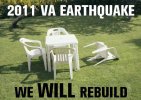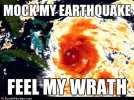Water - at least 1 gallon daily per person for 3 to 7 days
Food - at least enough for 3 to 7 days
— non-perishable packaged or canned food / juices
— foods for infants or the elderly
— snack foods
— non-electric can opener
— cooking tools / fuel
— paper plates / plastic utensils
Blankets / Pillows, etc.
Clothing - seasonal / rain gear/ sturdy shoes
First Aid Kit / Medicines / Prescription Drugs
Special Items - for babies and the elderly
Toiletries / Hygiene items / Moisture wipes
Flashlight / Batteries
Radio - Battery operated and NOAA weather radio
Telephones - Fully charged cell phone with extra battery and a traditional (not cordless) telephone set
Cash (with some small bills) and Credit Cards - Banks and ATMs may not be available for extended periods
Keys
Toys, Books and Games
Important documents - in a waterproof container or watertight resealable plastic bag
— insurance, medical records, bank account numbers, Social Security card, etc.
Tools - keep a set with you during the storm
Vehicle fuel tanks filled
Pet care items
— proper identification / immunization records / medications
— ample supply of food and water
— a carrier or cage
— muzzle and leash
I'm sure that there are other good lists and considerations that aren't mentioned here; this above one is a bare bones list. A while back I picked up the Handbook to Practical Disaster Preparedness which I have been leafing through for ideas. Even if you don't get many of the things on the list, at least it will get you thinking about what you may need and what helps in certain situations.
_http://www.amazon.com/Handbook-Practical-Disaster-Preparedness-Family/dp/1453678875
Another disaster that seems to be well on its way is the economic one. When this economy finally does 'collapse' food may be difficult to come by for a while. The
Preparedness thread seems like a good place to start.



